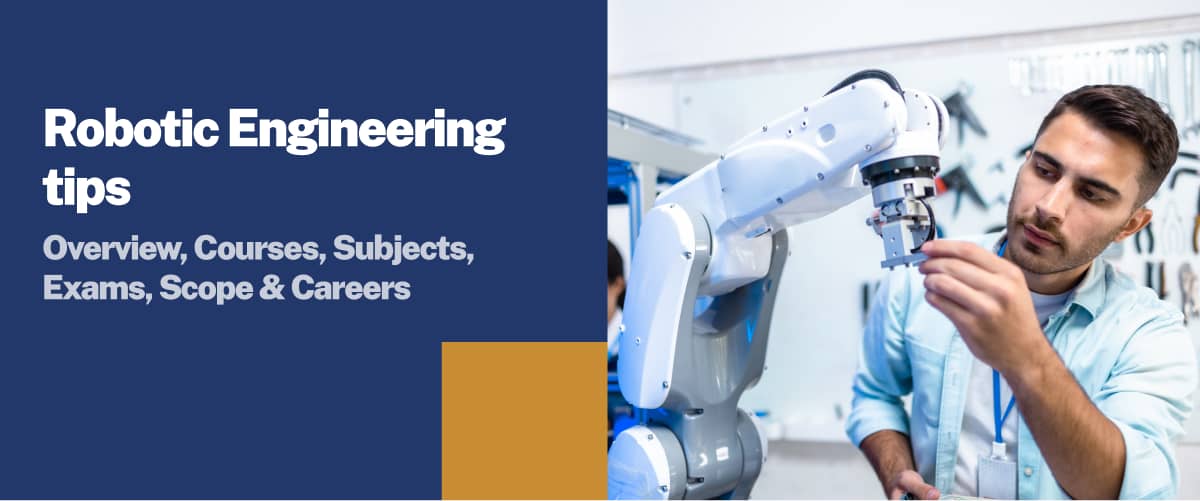5800 students unlocked their dream jobs with UG/PG programs in top colleges. Apply Now!
Robotics Engineering is a rapidly growing field that integrates mechanical, electrical, and computer engineering knowledge to develop robots that can perform various tasks. Robotics engineers design and build robots, and program them to perform specific functions, such as assembly line tasks, surgical procedures, or search and rescue missions. They also work on developing robot components, including sensors, actuators, and control systems, on making robots more accurate, reliable, and efficient.
Robotics engineering is a dynamic and challenging field that offers numerous opportunities for innovation and creativity. It is essential for advancing automation and artificial intelligence technologies. If you want to become a robotics engineer, you can surely go for a B.Tech degree in Robotics.
[Also read: new technology trends]
Robotics Engineering Eligibility Criteria
To study Robotics Engineering at the undergraduate level, the B.Tech degree in India, a candidate must have completed 12th grade with a minimum of 50-60% aggregate marks in Physics, Chemistry, and Mathematics (PCM) subjects. It is a 4-year course for Robotic Engineering provided by private and Government aided educational institutions in India.
[Also read: why choose B.Tech]
Entrance Exams for Robotics Engineering
Here is a list of Engineering Entrance Exams for Robotics Engineering Degrees in India:
- JEE Main: JEE Main is a national-level engineering entrance exam conducted for admission to premier institutions like IITs. JEE Main was previously known as AIEEE.
- IIT-JEE: IIT-JEE is a national-level entrance exam conducted primarily for admission to the engineering programs offered by IITs.
- GATE: GATE, or Graduate Aptitude Test in Engineering, is a national-level entrance exam conducted for admission to UG courses in the engineering discipline (M.Tech/M.E.).
- JAM: JAM, or Joint Admission Test for Masters, is a national-level entrance exam conducted for admission to UG courses like M.Sc., Integrated M.Sc., Integrated M.Sc.-PhD, and similar courses.
Some of the Engineering Entrance Exams at the State level are:
|
MH-CET |
CUSAT CAT |
HS TES |
|
UPSEE |
SMIT |
REAP |
|
JKCET |
BCECE |
AP EAMCET |
|
KEAM |
TS EAMCET |
WBJEE |
|
CG PET |
MET |
UKSEE |
|
UPSEE |
AUEET |
ASSAM CEE |
Some of the common Entrance Exams of private institutions in India are:
- BITSAT: Birla Institute of Technology and Science Admission Test is a university-level entrance exam conducted by BITS Pilani for admission to its UG engineering courses.
- LPU NEST: Lovely Professional University National Entrance and Scholarship Test is a university-level online test conducted by the LPU for admission to its UG and PG programs.
- IPU CET: Indraprastha University Common Entrance Test is a university-level online test conducted by Guru Gobind Singh Indraprastha University for admission to its UG and PG programs.
- SAAT: Siksha O Anusandhan University Admission Test is a university-level online test conducted by Siksha O Anusandhan University, Bhubaneswar, for admission to its UG and PG programs. SAAT also allows lateral entry for diploma students.
- SRM JEE: SRM Joint Engineering Entrance Examination is a university-level online entrance test conducted for admission to the UG and PG programs offered by all SRM group institutes.
- KIITEE: It is a university-level admission test conducted by the Kalinga Institute of Industrial Technology Entrance Examination for admission to its courses.
- GEEE: Galgotias Engineering Entrance Exam is a private university-level admission test conducted by Galgotias University, Greater Noida. This admission test allows entry to Galgotias University’s B.Tech and integrated B.Tech courses.
Robotics Engineering Courses
Robotics Engineering courses offer a deep understanding of various aspects and types of robotics engineering and can provide a foundation for advanced research or professional careers. Some of the common courses are -
- B.Tech in Robotics Engineering
- B.E in Robotics and Automation
- B.Tech in Mechatronics Engineering
- B.E in Mechatronics
- B.Tech in Artificial Intelligence and Robotics
Robotics Engineering Subjects
The exact syllabus for the B.Tech degree may vary based on the universities or colleges offering the course. Here is a list of the common subjects related to robotics. The syllabus for Robotics Engineering in India typically covers the following subjects across various semesters:
|
1st Semester |
2nd Semester |
|
|
|
3rd Semester |
4th Semester |
|
|
|
5th Semester |
6th Semester |
|
|
|
7th Semester |
8th Semester |
|
|
Some institutes may have additional subjects or elective courses as part of their curriculum for the robotics engineering basics.
Furthermore, students can choose to specialise in the following courses or areas in Robotics Engineering at the undergraduate or postgraduate level based on the options provided at the university. Some of the common options for robotics engineering courses are:
- Micro-Robotics - Focuses on the design and development of micro-scale robots, including their micro-electronic components, actuators, and control systems.
- Automation - Provides a comprehensive understanding of automation techniques and systems, including PLCs, SCADA systems, and robotic automation.
- Bio-Cybernetics - Explores the integration of biological systems with robotic systems, including the design and development of biorobots, prosthetics, and other related systems.
- Medical Robotics - Focuses on the use of robots in medical applications, including the design and development of surgical robots, rehabilitation robots, and other related systems.
- Design and Control - Explores the design and control of robots, including kinematic analysis, motion planning, and control systems design.
- Robot Manipulators - Covers the design and control of robotic manipulators, including kinematic analysis, motion planning, and control systems design.
- Robot Motion Planning - Provides an understanding of robot motion planning techniques and algorithms, including path planning, collision avoidance, and related topics.
- Computational Geometry - Explores the use of computational geometry in robotics engineering and automation, including geometry processing, shape analysis, and related topics.
- Artificial Intelligence - Provides an understanding of artificial intelligence techniques and applications, including machine learning, computer vision, and related topics.
- Mechatronics Course - Provides an understanding of mechatronics, which integrates mechanical engineering, electrical engineering, and computer science to design and control advanced systems.
Robotics Engineering Career Options
The career options may vary based on the individual's interest, skill set, and job market demand. Some of the best career options for students after completing robotics engineering courses are —
- Robotics Research & Development Engineer
- Robotics Application Engineer
- Robotics System Integration Engineer
- Robotics Consultant
- Robotics Service Engineer
- Robotics Testing Engineer
- Robotics Software Developer
- Robotics Hardware Developer
Robotics engineering career offers good prospects, offering an average annual salary of ₹3.5 Lakhs. The salary range, however, goes up to ₹12 to ₹16 lakhs per year, depending on the candidate’s industry experience.
Some of the top recruiters in India are
- ABB India
- BOSCH
- Honda R&D India
- Mitsubishi Electric India
- Rockwell Automation India
- Schneider Electric India
- Toshiba JSW Power Systems
- Toyota Kirloskar Auto Parts India
- Universal Robots India
- Yaskawa India
Scope of Robotics Engineering In India
Robotics Engineering has a vast scope in India due to the rapidly growing technological advancements and increasing demand for automation in various industries. The government is also taking initiatives to promote the growth of the robotics sector in the country.
Some areas where Robotics Engineering has a significant impact and scope are:
- Manufacturing - Robotics is being used to automate various industrial processes, improving production efficiency and reducing costs.
- Healthcare - The use of robots in surgeries, rehabilitation and patient care is increasing, making healthcare more precise and efficient.
- Automotive - Robotics is being used to automate various processes in the automobile industry, leading to improved efficiency and increased safety.
- Agriculture - Robotics is being used to automate various farming processes such as irrigation, crop monitoring and harvesting, leading to improved yields and efficiency.
- Space Exploration - Robotics is used for space missions and building and maintaining spacecraft.
There is a growing demand for skilled professionals in this field, so it is essential to know about robotics engineering and the various courses offered in educational institutions to use the best opportunities.
Conclusion
Robotics Engineering is a rapidly growing field that offers numerous career opportunities for those passionate about technology and innovation. The scope of Robotics Engineering in India is vast, with a demand for skilled professionals in various industries such as manufacturing, healthcare, and defence. So, if you plan to learn robotics, you may need to learn some complementary skills in other trending technologies. In this regard, you can register with Sunstone and take advantage of its industry-oriented training courses to get better job offers.
FAQ - Robotics Engineer
Which engineering is best for robotics?
Pursuing robotics engineering should probably be the best option if you want to become a robotics engineer. However, getting an electrical or mechanical engineering degree with a focus on robotics can also help you become a robotics engineer.
Can I become a robotics engineer after class 12th?
After you successfully complete your class 12th, you can pursue a B.Tech degree in robotics engineering or electrical/mechanical engineering to become a robotics engineer.
Does Robotics need coding?
Yes, robotics needs coding. Without coding, establishing communication with the machine will not be possible.
HELP
Take the first step towards your dream job.
ABOUT THE AUTHOR


